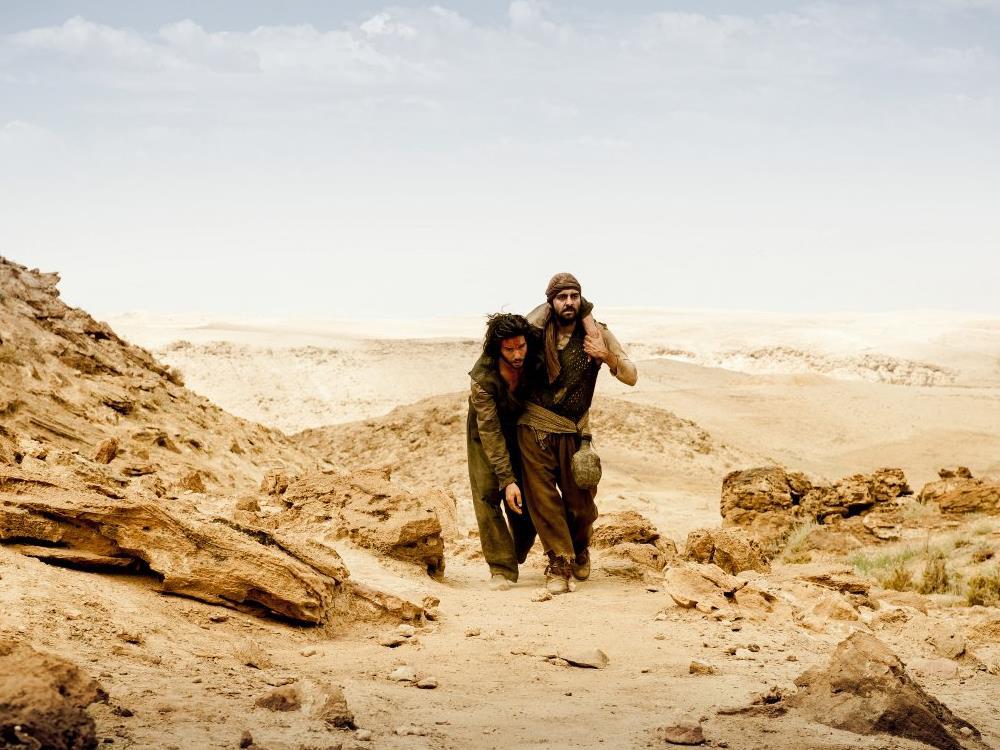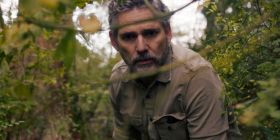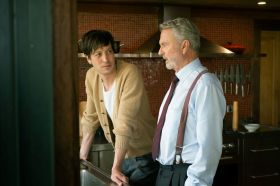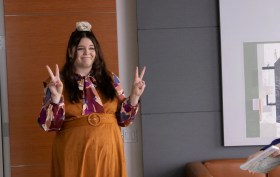As Nazaret Manoogian (Tahar Rahim, Samba) sets off in search of the life he has lost, a friend wishes him luck and farewell; “may your journey flow like water,” the man offers. It’s a well-meaning statement, but one immediately at odds with the horrors Nazaret has faced, as well as the hardship he knows will come. His trek to this point has more closely resembled the last drops of moisture being flung from an empty canteen, and his attempt to move forward starts as the slowest trickle from a waning stream.
Nazaret’s tale is sparked by the destruction of an empire, the forging of political alliances, and the branding of minorities as enemies as a result. In 1915, the Armenian Christian is a happy blacksmith making a modest living in Mardin, until he is ripped from his family and forced into servitude during the First World War. Breaking rocks and building roads in the desert doesn’t temper his spirit, nor does dicing with death or losing his voice. Reuniting with his twin daughters is the fuel that keeps him going, whether wandering through a sea of endless sand in the remnants of the Ottoman regime, or traversing the hostile wilds of the United States.
The Cut opens with metal being heated and moulded, an act and an image in line with the profession of its protagonist, but one purposefully pointed. Writer/director Fatih Akin (Soul Kitchen) laces the film and its central quest with visual manifestation of pain, anger and defiance – once more justified by the narrative, yet still just as blatant in their statement. A body buried in the desert, a well filled with twisted human forms, a father scouring crowds for a glimmer of familiarity, a man enveloped by an ever-changing backdrop: these are the powerful pictures that track the Armenian genocide and its long-lasting repercussions, as personified through Nazaret’s story.
It is to Akin’s credit that the sumptuous imagery, as crafted by cinematographer Rainer Klausmann (Diana) to resemble decades worth of roaming westerns, can bear the burden of conveying such devastation. Much of the movie’s weight is placed upon standout snapshots of physical and emotional suffering; indeed, The Cut shows its sadness with the keenest of eyes. It also tells of its heartache in the same manner, even with its lead rendered mute for most of its running time. Rahim may turn in a soulfully internalised performance, hurt and hope speckled across his stoic face; however the film remains as blunt in its brutality as its electric guitar-heavy score is brazen in its accompanying soundscape.
Indeed, where The Cut falters is not in its expression of the sorrow of this chapter of history, but in its sprawling script. As co-written by Akin with Mardik Martin (a collaborator with Martin Scorsese on Mean Streets, New York, New York and Raging Bull), it reaches for intimacy in telling Nazaret’s tale and expansiveness in its universal resonance, an approach that wavers more than it wins. Message-pushing supporting characters, sketched out as obvious symbols, help matters little, nor do episodic antics that jump from incident to incident and locale to locale. In an effort that forms the final part in the filmmaker’s Love, Death and the Devil thematic trilogy following 2004’s Head-On and 2007’s The Edge of Heaven, a portrait of endurance and perseverance fades into one of adventure. The feature makes a splash with its empathetic story of survival, but like its protagonist, it can never quite sustain a steady flow for its journey.
Rating: 3 stars out of 5
The Cut
Director: Fatih Akin
Germany | France | Poland | Italy | Canada | Turkey, 2014, 138 mins
Audi Festival of German Films
www.goethe.de
Sydney: 13–28 May
Melbourne: 14–28 May
Brisbane: 21–28 May
Canberra: 20–27 May
Adelaide: 27–31 May
Perth: 28–31 May
Byron Bay: 29–30 May
Hobart: 29–30 May
Actors:
Director:
Format:
Country:
Release:





